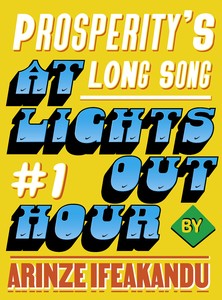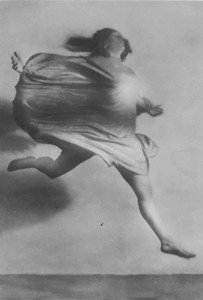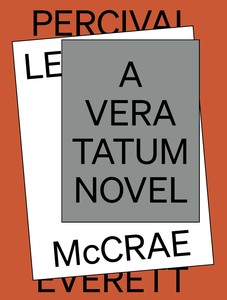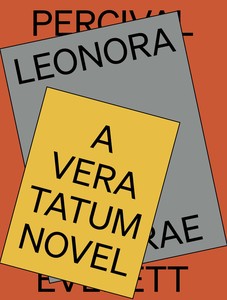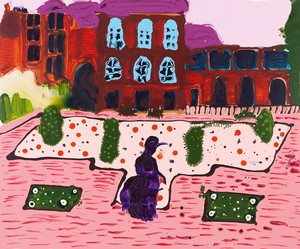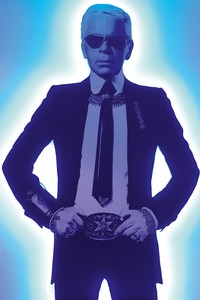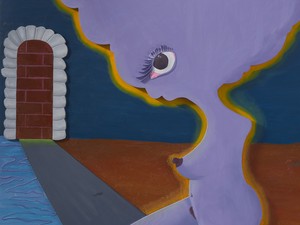When our breaktime was cut short by the bell for an impromptu assembly, we gathered in front of Block B, whispering speculations, our voices fizzing into a deafening buzz. Assemblies like this were quite common—the seniors and house masters never tired of barking threats and chores and reminders at us—but there was something uncommon about the air that day. It was not an expectant uncommon, as in those times when women’s groups from nearby parishes visited, outdoing one another with the most filling, most delicious coolers of jollof rice and fried meat, singing Uka Nne songs with us and dancing in one spot, retying the loose ends of their blue Mothers’ Union wrappers like people performing an absent-minded ritual. It was rather a pregnant uncommon, like when clouds gather before rain, and as we waited for the arrival of Chaplain—who arrived shortly with Senior Eche in tow like a steadfast bodyguard—the prattling was about the new graffiti on the stairwell of Block B, which had appeared in the wee hours of morning, declaring The boy sees, the boy saw, the boy testifies.
I was standing beside Samson, who, on the tips of his toes, was on the lookout for Soludo. Be on the lookout too, Ifeanyi, he reminded me. Soludo had sworn to “rearrange Nko’s face.”
Nko and I were not good friends, he was generally skittish and short-tempered, but he was in JSS 1 like me, and Samson liked him and I liked Samson. Personally, I’d asked him why he thought it okay to go about telling everyone that he had seen something he imagined to be Collins’s ghost that morning, when we all knew that Collins was recuperating in a hospital near Eke Awka, that Collins and Soludo were inseparable paddies, and that Soludo, rarely getting into fights, was ruthless when he did, so that even the most fearsome senior respected themselves around him whenever, feeling righteous, he whipped out his unbendable frown. Earlier, he’d stopped by my class to ask if I’d seen Nko, looking suspiciously at me when I said no, with his side-eye that said You’re lying, before relaying the message to me: “Well, whenever you see him, tell him to never stop running, because I will rearrange his face and bear the consequences after.”
Chaplain had on his casual jeans and shirt, not the white cassock I loved to see him wear, with its pellegrina billowing around his shoulders when touched by wind, like angel wings, and Senior Eche was in his white school uniform like the rest of us. My first impression on my first day at Marian Boys’ was that Senior Eche was a wicked, wicked boy; this impression had not changed, but I had come to like him a bit more since joining the choir, the way he would ask me to his corner, making me sing for him, the way he exclaimed, “Chai, see your smooth voice like a girl’s—a real alto too, not all these falsettos.” I ignored it when Samson warned that I would soon find exactly what I was looking for in “that shady boy’s corner.”
After Senior Eche had boomed at us (Marian Boys, he commanded in a soldier’s bass, Quiet!) and the air was dead, Chaplain collected the speakers and, in the gentlest way, broke the news about Collins and, with the same calm voice, asked us to return to class.
Collins had woken up with a mild fever the day before, and by evening he was frying in bed. He was rushed to the hospital that night, the school Aunty Nurse’s efforts having amounted to nothing, and by the next morning he was gone.
“Gone?” Bobby asked, obviously in shock. “Like, he went back home and is changing schools?”
“Sometimes, you ask questions like a foolish person,” Kosi retorted. “Were you not there on the assembly ground?”
“I was in the toilet.”
We were seated, that early afternoon, on a bunk by the door of Waddington House, the bell for the end of breaktime having gone off minutes before, alone in our white school uniforms, our peers having returned to class. The door was open a crack, the windows shut, and sunlight carved the darkness in a clear right-angle around our sandaled feet. I felt guilty for noticing, for being there and noticing the slant of light through the cracked door, when my beloved friend was dead. The air was swollen with our ripening. We become men today, I must have thought, although I’d known, more than the others, the unfeeling touch of loss. My father had died from sickness when I was seven, and two years later I lost my closest aunty and cousin in a motor accident. I felt vacant within, as though a great wind had blown my insides away, leaving behind an empty room full of silence, the voices of my friends rolling off the soft black rock that had become my mind into the roiling pits of my stomach. They were stupefied, prattling about things I did not know nor care about—all I could think about was the burning heat of Collins’s neck against the back of my hand as I carried him to the dispensary, the coldness of his sweaty back as I held him, our friends cluttered behind us, begging Aunty Nurse for a pass or a phone call home, since they wouldn’t take him to the hospital until they were sure it couldn’t be handled in school—it was common malaria, after all, they’d argued.
We were late for the second half of classes, but who could expect concentration, function, from us today? Chaplain had tried to be compassionate during his announcement, urging everyone back to class, saying, “I understand how you feel but some of you have national exams very soon, and we cannot release the rest of you to constitute nuisance while they sit in class. It wouldn’t be fair.” The reality? They wanted comportment, to keep the teachers and students busy while the executive arm convened amongst themselves. There must be no strange whispers circulating around our gray-and-oxblood walls, not when the official story had not been ironed out. It wasn’t something small that had happened to my friend, and it certainly hadn’t surprised them out of the corners: long before the fever that shut him down, Collins had complained to Aunty Nurse and Uncle Math (who was both senior master and acting vice principal) about his biting stomach and thrumming headache—and what did they do? Fluids and fruits, Andrews Liver Salts, nameless pills in a small white envelope. What would a phone call do? Aunty Nurse had asked. Do you expect his people to come from Kaduna because of malaria?
Something began rising in my head, it was a fog and a riot, like the sneaky voice of Ekwensu calling me to violence, and I was ready to answer its call, possessed by rage, possessed, my body no longer mine. I did not even realize I’d been seated all along until I found myself jumping up from the lower bed, until I heard the explosion of my own voice from the deep canal of what felt like a distant and remote self, thundering We asked them for a pass! We asked them for a pass! Things poured from my eyes and nose; inside me a dam had come undone. Someone held me and I struggled, saying No, we asked, we asked, shaking in his arms, quietening into small heaves of sniffling sorrow.
The boys watched, astounded, and I looked at them through gauzy eyes. Collins had died, was dead . . . death has done its worst, Chaplain had said. It signified nothing, dead, die, death, they were mere words in their lexicon and had no currency yet in their minds, so they pondered without approximation, groping in the dark of inexperience for the true meaning of forever.
In the poppy fields of their minds, Collins had gone for a really long holiday from which he would soon return.
The boy sees, the boy saw, the boy testifies. Nko repeated this phrase around school, bouncing on his springy feet from place to place, like an apostle of Marian Boys who must tell everyone that Collins had returned, early that morning before the tragic announcement, to get his most precious things.
Nko had known, he told Samson, OBJ, and me, when he saw Collins standing gloomily by his locker in Awka House, that something was off—it was the way he stared at his box and locker, morose, as though stunned into confusion by something far beyond his understanding. It must have been the great hand of Onwu on his shoulder, guiding him home—but how would Nko know this, how could he, when no man had seen the face of Death and lived to tell the tale? He’d only seen the face of the dead boy, his stark, bewildered face as he looked up at Nko, who had called his name, surprised to see him back so soon and standing on his two-two legs when only the night before, Soludo had had to carry him out of the hostel, hoisting him onto his shoulder, into the back seat of Chaplain’s car. One second was he there, the boy Nko had thought was Collins returned early, and the next second was he gone, vanished into space. It was at that point that Nko screamed, wailing Collins o, Collins o!
“How could I be spreading rumors when I have been telling you what I saw before Chaplain broke the news?” Nko asked.
“You know Soludo won’t believe you,” I said. “Maybe stop sharing the story for now.”
“But when will I tell it? Obviously Collins wanted me to see him, wanted me to convey a message—if not he wouldn’t reveal himself to me. Ghosts don’t just show themselves to anyone.”
“Don’t mind Ifeanyi,” Samson said. “He will support anything Soludo does. But I am more worried about Chaplain hearing it, you know how he feels about these kind of things—‘superstitions.’ And what if the ghost does not mean good? I’m a little concerned, I won’t lie to you.”
It was free time, soon it would be dinner and night prep, and we were clustered in OBJ’s corner at the extreme wall of Amawbia House, heads hidden by the top bunk, bodies shielded from view by surrounding bunk beds that darkened his corner, making it a perfect spot for covert meetings. Soludo had since added a second threat over Nko’s head: When I catch him, I will squeeze the hallucination out of his throat. He had been angry all day, even I was afraid of approaching him: he’d ignored and then shouted at me earlier when I went to his corner after classes to say sorry. Everyone knew he was on the prowl for a victim.
“Does it mean that you are the boy that sees, the boy that saw, the boy that testifies? So the new poem on that wall is about you?”
“Or, maybe, he somehow heard the news earlier than the rest of us, wrote his rubbish on the wall and began bragging to everyone about seeing a ghost.”
We all jumped, having not noticed Osita approach. He towered now above the bunks, tall Osita with the unformed moustache, leaning lazily against a top bed, his jaws in his hands, face smug with an always grin.
Nko rolled his eyes, hissing, he was short and smallish with thick sideburns, Nko, and sometimes resembled the wicked uncles in Nollywood movies, especially when he closed his eyes and hissed like a snake. “Please stay away from me, Osita,” he said. “I don’t have your time today.”
“No problem,” Osita said, shrugging. He turned around, sauntering lazily toward the door with his plate and utensils in his hand. For a bad boy who listened to no one, he certainly kept to the laid-down dining etiquette—he was probably the only one in our class who, in second term, still took a fork, knife, and spoon to dining, as instructed during Orientation, even though we never used the former two, wolfing down everything with our spoons, from rice to beans to swallow.
“Chelugodi,” OBJ said, rising with his big belly, his face spattered with suspicion. He stood on the balls of his feet, peeking above the array of bunks toward the door, then turned to Nko, eyes wide and apprehensive. “Soludo is here with some senior boys and they’re locking the door.”
We jumped to our feet, Nko’s alert eyes darting this way and that way for an escape. In a quick flash, he skidded under a bunk, squeezing between the gallons and pails chained underneath, wetting and dirtying himself in the muddy spill. Shame attacked my head and guilt gnawed at my throat—to be seen here by Soludo, it felt like a betrayal. I was ransacking my brain for an explanation but nothing came up, only the silly excuses of a bad friend.
I wondered if this was to be the day Soludo and I would become enemies.
There were five boys in all—Seniors Kosi and Metu, then Bobby, Osita, and Soludo—and I was looking at Samson’s face, pleading with my eyes for his compliance, he was fond of fighting everyone, including seniors, which was why he was always getting beat up.
“Where is he?” Senior Kosi asked, looking into OBJ’s corner. “Nko? Nko baby, we don’t want to hurt you, we only want to hear your story.” He turned to Osita. “Are you sure you saw him here?”
“Of course,” Osita said, peering into the corner as well. “Or has he become a ghost, too?”
Nko was motionless under the bunks—I tried not to let my eyes descend—making me think of a boy-sized rat hiding from the broom-wielding owners of the house. I kept my eyes above, trying to catch Soludo’s eyes, but he’d looked at me once like one would look at a stranger, without ill or good feelings, with an empty glare, and did not look at me again, his eyes glazed, his lips pursed with annoyance. It was he who dashed for the door the second Nko slipped out, rushing for the exit, having been spotted by Osita. It was he who grabbed Nko’s collar from behind, pulling him to the ground. He who bestrode Nko’s back, as if ready to rain slaps or punches on his head. He who did not look at me when the seniors asked us all to leave, Osita included, holding Nko hostage in the near-empty dormitory.
The watchmen arrived after lights-out, skulking for defaulters, boys who, after the bell was rung for the end of prep, were found wanting, cavorting around school in search of water for tomorrow or secret rendezvous with their friends. They whipped your back gleefully, the watchmen, like it was a game to them. Usually they restricted their activities to the corridors and Classroom Block, but they lurked, that night, within the stolid halls, searching for movement.
Chaplain was yet to call me into the principal’s office but they had called all my friends, had told them something terrible, because when Bobby came out of that office during night prep his face became a mask of nothing and he placed his head over his desk, his shoulders shaking from crying. When I asked if they were still on board with the plan to accost Collins’s people when they visited the school and tell them the full story of everything that happened, Bobby said, “Just let it be. This would not have happened if God did not want it to,” and the other boys agreed, saying, It has happened, it has happened.
It was past lights-out and I knew they would call me tomorrow. The fact that they did not summon me after Nko reported that I’d threatened to make a ghost of him (this after I’d given him a few knocks on the head), it meant they were saving the best antics for me. The spirit of violence had left my body, now I felt only a desire to weep or to sleep a deep, dreamless sleep, and when I woke up, I wanted the dream to have been this, my waking moment in which Collins was no more. If I were to dream, however, I wanted to see Collins alive, to ask him if he had indeed appeared to that boy, Nko, and then I wanted to brag to him about all the ways I would dominate his house, Awka House, during the forthcoming interhouse sports competition. We had been talking about it all term, looking forward to it, saying to each other, My house will wipe the floor with your people.
When my aunty and cousin died in the accident, I saw them in my dreams for a month. They were not alive in the dream, they were ghosts looking in at me through the window, always standing outside in their funeral whites and their divine faces. Nothing about them frightened me, they were dead, after all, and ghosts were supposed to terrify us, and yet I was never afraid, their presence at my window always a source of consolation. Waking up from those dreams, I wept with thoughts of heaven, of our great reconnection, wishing the Trumpet would sound the very next day. Only the waking darkness of my room frightened me, unknown specters slinking between the odds and ends cluttered there, among the clothes hanging in the doorless wardrobe.
We’d grilled Nko for fifteen long minutes and he had not admitted to being privy to the news of Collins’s passing, had not agreed that he’d written the words on the wall (Let me bring you my notebooks so you can compare the handwritings, he’d said), and I’d refused to budge, saying, “You are a big fat liar and you must say the truth today. I know you’re one of Aunty Nurse’s pets, always going there to gossip and to collect vitamin C.”
I thought again of tripping him in the hallway.
I tossed and turned, tossed and turned. Bobby? I whispered, but he was breathing like a whistle in the bunk next to mine, his eyes open to the world, someone who didn’t know him would think he was wide awake. Outside the window the palm tree genuflected, and I felt deeply alone.
“Hey, hey.” It was Soludo nudging me awake. “Want to sleep with me?”
I woke up slowly, relief rising within me. There he was, bent over my bed, my friend Soludo. I scooted, letting him slide into my tiny bed. He wrapped his arm around my body, holding me. It was not our first time sleeping that way, Soludo sometimes asked for cuddles and I did too, and I’d come to cherish his village-boy smell, which was not repugnant at all, it was simply a distant whiff of accumulated labors. He was warm against my body, solid, a human presence, and I was falling asleep again to the motions of his thumping heartbeat. His lips grazed my ear and I felt the coolness of his breath as he said, Tomorrow I am running away.
